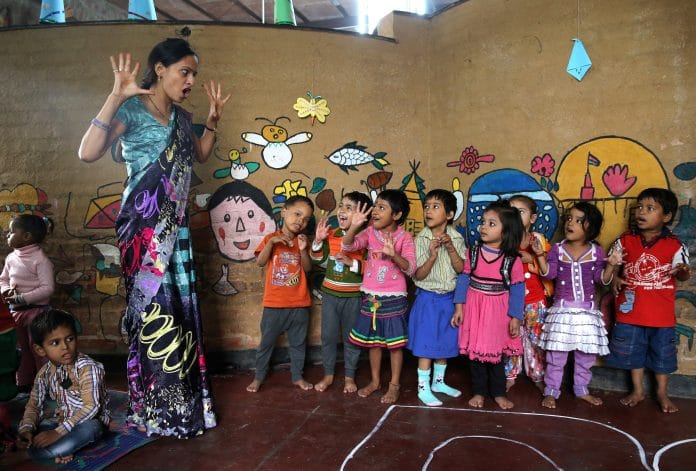As Narendra Modi felicitates teachers, we must pay attention to their fight for basic rights and respect.
Teachers’ Day in twelfth grade saw my entire batch dress up in formals as we took our teachers’ place in the classroom. It was a thrill. Being on the other side of the table was something exciting because our teachers were special to us. They were (despite the number of cudgels we picked up with them) our guides into a bigger, vast world. Teachers forced us to think, to question, and to learn.
In hindsight, if we had known how teachers in India are truly treated, we might have treated this day rather somberly.
The National Policy on Education, 1986, states a simple, but immensely powerful line: “The status of the teacher reflects the socio-cultural ethos of a society; it is said that no people can rise above the level of its teachers.”
Also read: India has 10 lakh teaching vacancies. India has 4 lakh excess teachers. Go figure.
But, in reality, our teachers have been reduced to a people who have to fight for their basic rights as citizens even while providing an invaluable service to the country.
Teachers across educational institutes have been taking to the streets to demand what is rightfully owed to them. The teachers of the Delhi University Teachers Association (DUTA) were on a 40-day strike starting in May against the government’s move to force DU colleges to accept autonomy, and only went back to correct papers when the most vulnerable teachers on the totem pole–those in ad-hoc positions–were promised job safety. In Maharashtra, over 7,000 junior college teachers went on strike earlier this year to demand that the government pass a resolution promising them a livable salary and an old-age pension. In August again, the staff of over 800 government schools went on strike with other employees to have the Seventh Pay Commission implemented. Teachers of the Nagaland Rashtriya Madhyamik Shiksha Abhiyan Teachers’ Association (NRMSATA) had to go on strike in August too because they were offered a terrible choice: that of accepting lower salaries or risk being terminated.
Also read: Given Left’s grip on colleges, arranging marriages are easier than holding seminars in India
These protests and strikes come from years of injustice and slighting. Our country has been undergoing an education crisis for a few years now. We were nearly 1 million teachers short back in 2016, and the numbers haven’t improved since. The teachers who are already in the system have been barely, if ever, given their due. As the Prime Minister honours teachers for their incredible work, teachers who have been working on a contract basis will still be pushing for the Supreme Court order on equal work for equal pay to be implemented. The saddest thing, probably, is the fact that glorious institutes are poised to take off in the country, but budgets to get permanent teachers have simply been disregarded.
India prides itself on its ancient guru-shishya tradition, the oft-quoted institution of pupil-teacher bond that goes beyond the classroom, and permeates the very fabric of the society.
One of the key duties of a teacher has always been teaching the art of scepticism and curiosity. Teachers don’t always have the answers, but if they can inculcate the practice of questioning in students, they are fulfilling their mandate. However, in India today, any teacher who asks questions is told to keep quiet, or forced to shut up.
Also read: How underpaid ad-hoc teachers are keeping Indian universities running
Take the examples of ELFU Professor K. Satyanarayana, whose residence was raided, and who was asked why he had ‘photos of Ambedkar and Marx instead of gods and goddesses’ up on his walls. The pattern is simple and has been repeated under every authoritarian regime from Mussolini’s Italy to Erdogan’s Turkey. The professors always go first, because the professors always question first.
Teachers are blamed for everything from ‘bad’ marks to a world increasingly unsafe for children. When they are held liable for not ‘recognising the signs’ of
abuse, mental illness, or bullying, we forget that these are underpaid, overworked people whose labour is considered lesser than of other workers. Teachers are not afforded the time to update their skills, the space to express empathy, or the patience to deal with the individual needs of students. We have, in a rush to prove that we can make students pass with good grades, have forgotten that education is not just about clearing exams.
It’s difficult to not feel infuriated when you realise that a country with over 50 per cent of its population under the age of 25 has deprived its most vulnerable citizens of good guidance, tutelage, and education.
But whom do the students look up to when teachers are systematically stripped of their rights? Whom do the students learn from when the teachers are deprived of a chance to teach?
Harnidh Kaur is a poet.







Indian Education is a farce – the main people responsible for this are the so-called “Teachers” . The focus of education is the “Student” – not the teacher. The Teacher is a facilitator – not the object of an educational system. Please don’t try to elevate mediocrity into nobility. While these teachers demand more pay, more privileges where are the voices demanding more scholastic ability, more work, more accountability and more responsibility from the teachers ? Guru-shishya died with the invasion of Babur – today we have Macaluay’s educational system. Let us not claim “guru-shishya” paramapara while peddling British model education that is now intellectually moribund . PM Modi just like everybody is humoring these teachers – he like everybody else in India started real “learning” once the teachers left their life.